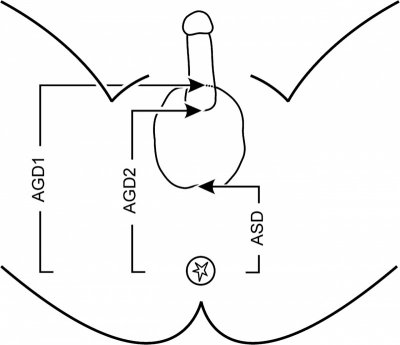Nelson Vergel
Founder, ExcelMale.com
Hum Reprod. 2016 Apr 6. pii: dew052. [Epub ahead of print]
Anogenital distance is associated with serum reproductive hormones, but not with semen quality in young men.
Zhou N1, Sun L1, Yang H1, Chen Q1, Wang X1, Yang H2, Tan L1, Chen H1, Zhang G1, Ling X1, Huang L1, Zou P1, Peng K1, Liu T1, Liu J1, Ao L1, Zhou Z3, Cui Z4, Cao J4.

Abstract
STUDY QUESTION:
Is anogenital distance associated with semen parameters and serum reproductive hormone levels in males?
SUMMARY ANSWER:
Anogenital distance is associated with serum reproductive hormones, but not with semen quality.
WHAT IS KNOWN ALREADY:
Epidemiological studies have suggested that anogenital distance (AGD) may be associated with testicular dysfunction in adult men. However, the role of AGD in estimating male reproductive function remains unclear.
STUDY DESIGN, SIZE, DURATION:
We examined the associations between AGD and semen parameters and reproductive hormones levels in 656 young college students in a Male Reproductive Health in Chongqing College Students (MARHCSs) cohort study in June of 2014.
PARTICIPANTS/MATERIALS, SETTING, METHODS:
In this study, two variants of AGD (AGDAP and AGDAS) were measured in 656 university students. Serum levels of testosterone (T), estradiol (E2), progesterone (P), prolactin (PRL), luteinizing hormone (LH), follicle-stimulating hormone (FSH), sex hormone-binding globulin (SHBG) and inhibin-B; and semen quality outcomes, including semen volume, sperm concentration, total sperm number, sperm progressive motility, total motility and morphology, were assessed. The associations between AGD and semen parameters/reproductive hormones levels were analyzed using multiple regression analysis.
MAIN RESULTS AND THE ROLE OF CHANCE:
Both AGDAS and AGDAP were not associated with any semen parameters. In the non-parametric correlation analysis, AGDAP were correlated with sperm progressive motility and reproductive hormones of E2, testosterone, SHBG and the testosterone/LH ratio. However, body mass index (BMI) also significantly correlated with serum testosterone (r = -0.216, P = <0.0001) and SHBG (r = -0.229, P = <0.001). In the multiple regression models, AGDAP was negatively associated with the serum E2 level (95% CI, -0.198 to -0.043; P = 0.002) and positively associated with the ratio of T/E2 (95% CI, 0.004-0.011; P = 0.001) after an adjustment for BMI and other confounders.
LIMITATIONS, REASONS FOR CAUTION:
Using only a single semen sample to predict male reproductive function over a longer period is a potential limitation of the present study. The other limitation is the cross-sectional nature of the study design. Longitudinal data from an extended follow-up on a large cohort would be more definitive.
WIDER IMPLICATIONS OF THE FINDINGS:
Our results do not support previous studies where AGD is associated with male semen quality. The utility of AGD in predicting reproductive outcomes in adult males should thus be considered prudently.
Anogenital distance is associated with serum reproductive hormones, but not with semen quality in young men.
Zhou N1, Sun L1, Yang H1, Chen Q1, Wang X1, Yang H2, Tan L1, Chen H1, Zhang G1, Ling X1, Huang L1, Zou P1, Peng K1, Liu T1, Liu J1, Ao L1, Zhou Z3, Cui Z4, Cao J4.

Abstract
STUDY QUESTION:
Is anogenital distance associated with semen parameters and serum reproductive hormone levels in males?
SUMMARY ANSWER:
Anogenital distance is associated with serum reproductive hormones, but not with semen quality.
WHAT IS KNOWN ALREADY:
Epidemiological studies have suggested that anogenital distance (AGD) may be associated with testicular dysfunction in adult men. However, the role of AGD in estimating male reproductive function remains unclear.
STUDY DESIGN, SIZE, DURATION:
We examined the associations between AGD and semen parameters and reproductive hormones levels in 656 young college students in a Male Reproductive Health in Chongqing College Students (MARHCSs) cohort study in June of 2014.
PARTICIPANTS/MATERIALS, SETTING, METHODS:
In this study, two variants of AGD (AGDAP and AGDAS) were measured in 656 university students. Serum levels of testosterone (T), estradiol (E2), progesterone (P), prolactin (PRL), luteinizing hormone (LH), follicle-stimulating hormone (FSH), sex hormone-binding globulin (SHBG) and inhibin-B; and semen quality outcomes, including semen volume, sperm concentration, total sperm number, sperm progressive motility, total motility and morphology, were assessed. The associations between AGD and semen parameters/reproductive hormones levels were analyzed using multiple regression analysis.
MAIN RESULTS AND THE ROLE OF CHANCE:
Both AGDAS and AGDAP were not associated with any semen parameters. In the non-parametric correlation analysis, AGDAP were correlated with sperm progressive motility and reproductive hormones of E2, testosterone, SHBG and the testosterone/LH ratio. However, body mass index (BMI) also significantly correlated with serum testosterone (r = -0.216, P = <0.0001) and SHBG (r = -0.229, P = <0.001). In the multiple regression models, AGDAP was negatively associated with the serum E2 level (95% CI, -0.198 to -0.043; P = 0.002) and positively associated with the ratio of T/E2 (95% CI, 0.004-0.011; P = 0.001) after an adjustment for BMI and other confounders.
LIMITATIONS, REASONS FOR CAUTION:
Using only a single semen sample to predict male reproductive function over a longer period is a potential limitation of the present study. The other limitation is the cross-sectional nature of the study design. Longitudinal data from an extended follow-up on a large cohort would be more definitive.
WIDER IMPLICATIONS OF THE FINDINGS:
Our results do not support previous studies where AGD is associated with male semen quality. The utility of AGD in predicting reproductive outcomes in adult males should thus be considered prudently.
















